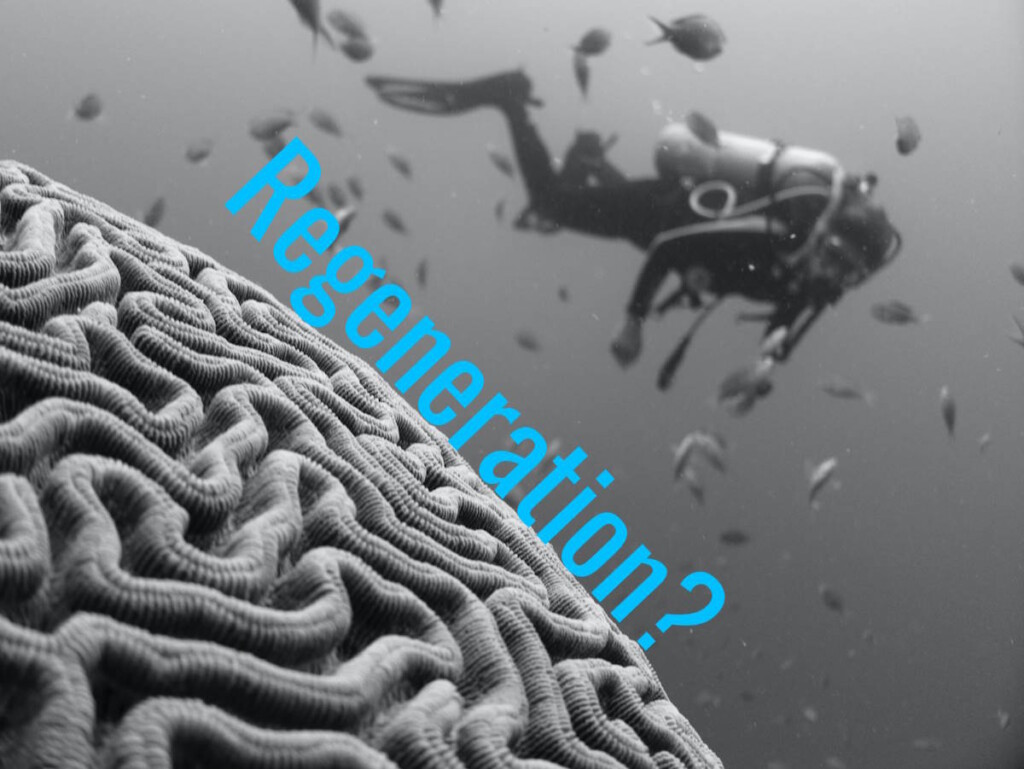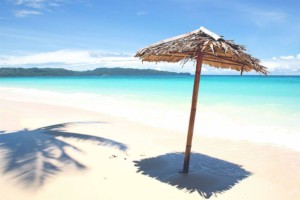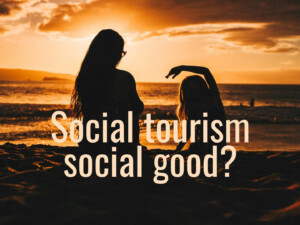Souvenirs: Can three pieces of coral inspire tourism towards ocean regeneration?

Three pieces of coral, and the memories they evoke, inspire K Michael Haywood to consider how travel & tourism stakeholders might contribute to ocean regeneration.
It’s a “Good Tourism” Insight. [You too can write a “GT” Insight.]
Every souvenir deserves a valued space in our homes. As gathered from the beach in Sao Martinho do Porto, Portugal, my recently found objects are gorgeous stones that now line the base of a birdbath.
But the souvenirs that have become renowned for their value and wisdom are “three pieces of coral resting on my window sill”; mementos of Bahamian beach-life enjoyed with two of our grand-daughters.
To this day they remind me of the lapping of waves, the endless sandcastles that washed away, the aromas of beach-barbecue jerk chicken, Bob Marley’s natural mystic-positive vibrations, and the rhythms of the people that characterise the sensational awe of island life.
Don’t miss other “Good Tourism” content tagged ‘Coastal and marine tourism and cruises’
These pieces of coral represent a constant reminder of my youth. Having grown up in the Bahamas, my love of the Caribbean Sea and its reefs know no bounds.
Unfortunately the reefs’ ability to maintain foundational and evolutionary advantage is under constant threat and neglect, well-articulated in this programme on Caribbean Survival in the Anthropocene.
Hopefully the means through which people can change their memories is by predicting the ocean’s future; a future requiring foresight, an ethical frame of reference, a reliance on science, hope, and the careful reconsideration of past memories, leading to more poignant scenarios for thrive-ability, beyond mere sustainability.
Memories in future tense: Activating ocean regeneration
The more I examine these three pieces of coral I’ve noticed lately that they are no longer resting. They have become restless and shrill.
“Three pieces of coral restless on my window sill” demanding resolution to the plight of the seas that is pushing coral reefs towards precarious tipping points.
It’s obvious to all of us. Whether at the beach, fishing, diving, or on a cruise, we cannot help but be dismayed, as we witness our egoistic use, misuse, and abuse of the seas.
Also read Krisztina Eleftheriou-Hocsak’s “GT” Insight ‘One tourism beach at a time: Local action can help turn the tide on marine plastic’
The pollution from our garbage and coastal developments, reprehensible, destroying the reefs and their soundscape, resulting in a struggle for survival of all species therein.
Sure, the Nature Conservancy and the Central Caribbean Marine Association may be in action mode, but it would help immensely if we amplified their work by linking our collective sensory experiences to ocean conservation.
Not simply by discussing, describing, and depicting what’s happening, but by:
- Becoming warriors in the defence of the seas;
- Determining how our future is playing out;
- Resolving the UN’s concerns regarding our oceans;
- Applying Blue Ocean Leadership;
- Changing the game in order to change the world;
- Encouraging every private and public sector organisation to come to their senses; and
- Helping each to reformulate their own ‘perpetual purpose’ with the seas in mind; a task demanding changes in behaviours and how we frame the challenges.
We’re fortunate for the multi-disciplinary collaboration and reformation of the Blue Economy in the Bahamas. While their efforts need to be emulated, there has to be a call-out for a slew of even more progressive sea-changes.
It begins, believe it or not, by re-establishing our belief in democratic capitalism so that tourism, as the Caribbean’s economic powerhouse, can be repurposed and re-valued as the means toward recognising its inter-dependence with the sea, by re-conceptualising how it utilises the sea, by figuring out how to price its pricelessness.
Read more “Good Tourism” Insights by K Michael Haywood
It’s going to be a drawn out process, requiring the use of catalysts for change.
To this end, as we live our lives forward, I foresee:
- Coalitions of organisations applying science and a sense of awe for deeper appreciation for, and conservation of, the sea, coastal areas, and marine life;
- Portrayal of their indispensability and exploration through stories, film, and media;
- Ensuring governments/organisations honour their budget allocations to environmental, social, and corporate governance (ESG) issues;
- Prioritising ESG requirements — measured and managed — for all enterprises;
- Curtailing waste and pursuing re-engineering to correct operational deficiencies;
- Encouraging and promoting circular economies;
- Corporations and SMEs supporting ocean charities;
- Novel application of Blue Finance for repairing pollution-prone infrastructures;
- Sandboxes, sensor toolkits, and empathetic design thinking utilised for tourism and destination innovation, its democratisation and co-creation possibilities;
- Every island visit as an immersive, intimate, and sensorial sea experience; our senses expanded to clarify reality;
- Souvenirs utilised to foster future memories about the sensorial seas;
- Building knowledge of the seas throughout all levels of education;
- Skills development for conservation of the seas e.g. Island Schools;
- Promoting cause-conscious destination marketing and branding to save the seas;
- On-going celebrations regaling the value of the seas and sea cultures;
- Attuning everyone’s sensibilities towards action-oriented regeneration; and
- Expanding the desire for Future Seas as catalysts for value-laden outcomes.
Once achieved I can only imagine those “Three pieces of coral feeling restful, relieved, and revived”, thankful that the UN’s High Seas Treaty will actually be honoured and implemented by all.
Until then, it is essential that we take ‘just’ action, do what is right, and get on with the tasks at hand.
What do you think? Share your own thoughts in a comment below. Or write a deeper “GT” Insight. The “Good Tourism” Blog welcomes diversity of opinion and perspective about travel & tourism, because travel & tourism is everyone’s business.
“GT” is where free thought travels.
Featured image (top of post): Can travel & tourism contribute to ocean regeneration? Brain coral and diver image by Vlad Tchompalov (CC0) via Unsplash.
About the author
K Michael Haywood is Professor Emeritus, School of Hospitality, Food and Tourism at the University of Guelph in Ontario, Canada. Prof Haywood has recently written an e‑book “Astonish, Smarter Tourism by Design”. Find Michael on LinkedIn.






